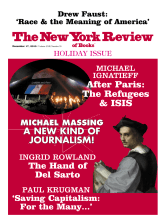In response to:
Free Speech, Big Money, Bad Elections from the November 5, 2015 issue
To the Editors:
I am extremely grateful to David Cole for his careful reading and thoughtful critique of Madison’s Music: On Reading the First Amendment [NYR, November 5]. Precisely because his review essay is so characteristically thoughtful, let me quibble with one important reservation that he advances.
Cole argues that it is not necessary to adopt my plea to read all six clauses of the First Amendment as a coherent narrative of democracy in order to reform our appalling campaign finance jurisprudence. All that is necessary, he suggests, is to tinker with the free speech clause by expanding the meaning of the word “corruption.” Under existing free speech precedent, campaign spending can be regulated to prevent “corruption,” but the term is narrowly construed to mean only bribery or extortion. Why not, argues Cole, simply expand “corruption” to include undue political influence?
Cole is right, of course, that such a welcome doctrinal change would go a long way to reforming our campaign finance system. But I fear such a change will not happen unless the Supreme Court realizes that the free speech clause does not stand alone in majestic isolation as a protector of a speaker’s autonomy. Rather, it is part of a larger First Amendment made up of six interdependent clauses that, read as a whole, celebrate the arc of a democratic idea.
Once the democracy-reinforcing narrative of the entire First Amendment is acknowledged, it is only a matter of time until the free speech clause is read as democracy’s best friend, instead of its hostile disciplinarian. Until the First Amendment’s democracy-reinforcing narrative is acknowledged, however, I fear that the Court will continue to turn a deaf ear to pleas to limit the free speech clause by expanding the meaning of “corruption.”
Burt Neuborne
Norman Dorsen Professor of Civil Liberties
Founding Legal Director
Brennan Center for Justice
New York University
New York City
David Cole replies:
When the Supreme Court revises First Amendment doctrine to permit greater regulation of campaign finance—and I do mean when, not if—it’s conceivable that the Court will cite Burt Neuborne and adopt his democracy-reinforcing view of the First Amendment. It’s also possible that, as I and others have suggested, the Court will expand the scope of “corruption” that justifies limits on campaign spending beyond the unnecessarily narrow conception of quid pro quo bribery and its appearance that now governs First Amendment law. (Indeed, Justice Stephen Breyer’s powerful dissent for four justices last year in McCutcheon v. Federal Election Commission does both, criticizing the majority for disregarding the democracy-enabling character of campaign spending limits and urging a broader conception of corruption.) Or it might take a third route altogether, one that neither Neuborne nor I have articulated.
I’m not sure much turns on the difference in the end. My departure from Neuborne’s fine and finely grained analysis is that I don’t think the campaign finance mess is principally a problem of doctrinal conception. The problem is a much deeper one, namely, a capitalist system that encourages and protects vast disparities in wealth, and a libertarian ethic that in this setting invites the super-rich to use their resources to hijack the political process. What will change that is not a doctrinal rereading of the First Amendment, but a broader cultural and political shift in the American people.
I am confident that that day will come. There is already widespread agreement that the electoral finance system is broken and needs fixing, and that the Supreme Court is part of the problem. What is needed is not so much a new interpretation of the First Amendment, although that will help, but a constitutional reform campaign that over time transforms the sentiment that there is a problem into action for change, in a multitude of different local, state, and federal forums. If the American people object long enough and loudly enough to an electoral system that allows the rich to run roughshod over the interests of the rest of us, the system will change. The answer, in other words, lies with us. So support the organizations working to change the status quo, including, needless to say, Neuborne’s own Brennan Center for Justice.



